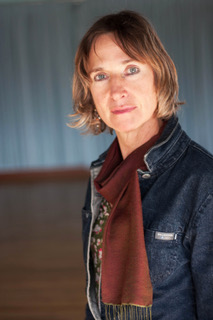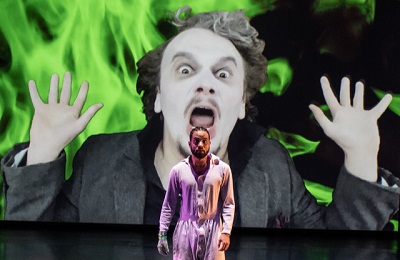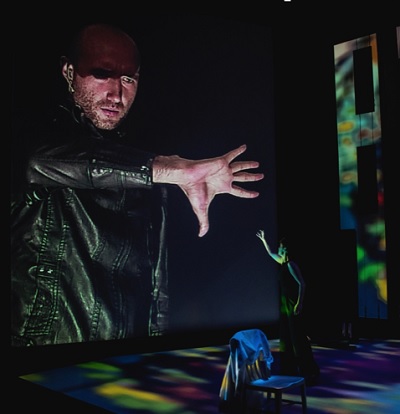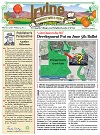
UCI Professor Annie Loui (Photo Credit: Claire Edmunds)
For me, plays, movies, dramas — live or on TV — afford boundless satisfaction. The welcome opportunity to explore the thoughts of a creator of theatre works came during an enjoyable interview with Annie Loui.
Beginning in 1980, her work in creating more than 60 productions has made Annie a very prolific artist. The UCI Drama Department has been fortunate to have her as a member of their faculty since 1993. Yet, placing Annie Loui’s name in front of a title is difficult. Her resume includes writer, director, choreographer, performer and more. There is not enough space here to list her many awards and publications.
Although I’ve discovered Annie late in her career, I recently attended two of her plays at UCI’s Experimental Media Performance Lab (xMPL): Reading Frankenstein and Madam Modjeska’s Wicked Fairytale. Both of these plays made a lasting impression on me, and I continue to discuss them with friends.
At last I had the chance to ask about something I’ve long wanted to understand: What is talent? When we’re absorbed by its presence, we applaud it. But, can anyone describe it? In Peet’s Coffee Shop on Campus Drive, Annie grasped my question at an innate level, providing two different perspectives.
As a Professor of Acting at UCI’s Clair Trevor School of the Arts, last year Annie reviewed over 700 applicants to the Drama Department. (At the graduate level, UCI accepts only about seven acting students each year.)
She began by saying: “Talent is difficult to describe, but here are some clues. Students convince you when you see their audition pieces. You are drawn in. You believe they’re feeling the feeling. You want to know more. That’s important.”

A scene from UCI’s production of Madame Modjeska’s Wicked Fairytale (Photo Credit: Sebastian Rock)
From 1986 to 1988, Annie was a resident choreographer at the American Repertory Theater in Boston. During that engagement, she worked with a variety of professional actors, telling me that a lot of very talented people passed through that theater. When I asked what made them stand out, Annie’s response was heartening: “The people whose work I liked the best were almost always decent people, too. Generous to other people. They worked hard, they were open and listening and attentive. You want people who are respectful, engaged and wanting to engage deeper. You look for this definitely.”
Like a river, Annie’s career has been fed from many streams. In addition to directing, acting, dancing, teaching, choreographing, writing, and movement coaching, she is also the founder of the UCI MFA (Masters of Fine Arts) degree on Movement.
Her journey began in 1966, when Annie’s father, while an acting teacher, became a founding member of the St. Louis Repertory Theater. “From the time when I was around five,” she revealed, “I worked with my father as a child actress. When I was about 12, I reached the end of my child actress career.” She added with a glint in her eyes, “This was sad because l liked to go to work with my dad!”
Annie’s mother earned a PhD in Comparative Literature. If drama is the river you intend to navigate, can you top that for a launch? In the late 70’s, Paris was a port of call for Annie. She lived there for three years in (what else) a garret. There, she studied choreography at the Paris Opera with dancer Carolyn Carlson.

A scene from UCI’s production of “Reading Frankenstein” (Photo Credit: Jesús Enrique López Vargas)
Spending so much time in the audience, I’ve always hoped to glance behind the curtain. When creating original theatre work, I’ve wondered how you mix the ingredients. So, I asked an indirect question about what she’s working on right now. Annie responded: “Next year, I am planning to produce a story that doesn’t yet exist as a drama.” Pay dirt!
Annie opened the curtain a bit by explaining: “When creating a play, I usually start with a book.” This time, she has uncovered a short story written by Dana Johnson — an award-winning Associate Professor of English at USC — about Biddy Mason. Annie told me: “There are certain things that just move you. This story is really rhythmic, in a very positive way. Biddy Mason was a midwife who helped ‘midwife’ Los Angeles. It’s going to become its own dramatic piece.”
Here’s a quick overview of Biddy’s story: Born a slave in Mississippi, Biddy joined a Mormon wagon train in the 1850s and walked all the way to California. After some nail-biting twists and turns, she discovered that slavery is illegal here. The wagons went on to Utah. No surprise, Biddy decided to stay. She became a businesswoman and philanthropist — building schools and churches — and one of the founding citizens of the City of Los Angeles.
“I don’t consider myself a playwright,” Annie acknowledges. So she has asked Dana Johnson to come back and assist her with writing the dialogue. Annie said: “Normally, I just take excerpts from novels and put them in actor’s mouths. That’s how I get dialogue. However, parts of Biddy’s story only exist in letters.”
Annie told me that she hopes next year will be the first stage of development which includes solving the staging and movement at UCI. The following year, she hopes to move it for a full-run in an LA theater.
Though it’s too soon to buy tickets, there will be space on my calendar-of-events for The Story of Biddy Mason. When I tune-in-later, I expect to see Annie on stage, introducing the premier presentation of what I anticipate will be a significant waypoint on a journey along Annie Loui’s illustrious career.
Click here for a partial list of Annie Loui’s original performance work.
Click here to learn about Annie Loui’s Counterbalance Theater.
Click here to visit Biddy Mason’s Wikipedia page.
Click here to read my article about Reading Frankenstein, which was co-directed by Annie Loui, Antoinette LeFarge.
Click here for a list of upcoming events at UCI’s Claire Trevor School of the Arts.
- Two Violinists, One Shared Mind - November 11, 2023
- Life in a House of Music with Zara B’Far - September 8, 2023
- Meet Susan Boettger & Family: Life in a Real-Time Music Festival - June 9, 2023



